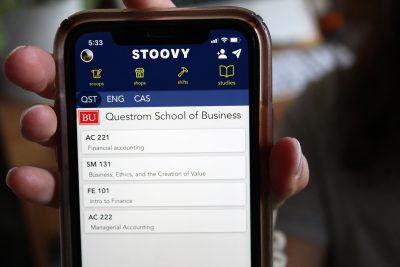Stoovy, an app coined after the abbreviated name of Boston University’s residential hall “Student Village,” is a university networking app aiming to connect students.

The app, available for free download on the Apple App Store, allows students to sell items to other students, request and accept quick jobs, find tutors and post to simply interact with others or ask questions.
The Stoovy app is the brainchild of Questrom School of Business 2020 alum Jack Claxton, who in 2018 helped launch StuVi Snacks— a play on words referring to “Scooby Snacks” — to be “essentially a restaurant food delivery service for students by students.”
Claxton said he and his roommates thought of the idea while living on campus after experiencing frustrations with food delivery — popular food providers such as GrubHub, DoorDash and UberEats don’t have a student ID, they cannot not bring food past security directly to students’ doors.
Since then, Claxton has expanded the company’s service to fulfill the ever-changing needs of college students beyond food delivery, now through a mobile app.
Though the StuVi Snacks portion of the app is currently unavailable due to the COVID-19 pandemic, the app now includes “shops,” a student buy-and-sell marketplace, and “shifts,” a request or accept quick jobs section, in addition to tutoring services.
Claxton also said he has launched the “scoops” section of the app, which is like a “social networking platform.”
“If they find a lost-and-found item, they can post it or if they want to promote their club, they can post,” he said, “in the sort of full Boston University chat, or just their own private class chat.”
He added that with Stoovy, for any of the jobs, users are paid directly through the app. This aspect adds another layer of protection for the consumer, he said.
“All of our providers are verified and background checked,” Claxton said. “All the payment goes through the app and then students can instantly cash out to their debit card.”
He added that if a student wants to accept a job or sell an item, after a background check, they will have a “digital wallet” within the app.
Claxton said Stoovy stands out from other popular platforms that have a similar purpose because of its emphasis on security.
“The number one thing I would say would be safety,” he said. “After signing up, you enter a closed network with everyone in your university and you know that whatever you post can only be seen by other people in your university.”
One defining safety measure of Stoovy is the requirement of a verified “.edu” email address, Claxton said. He added accessibility — given that every user is local — and flexibility with jobs also makes the app appealing.
Although Stoovy is mainly focused on BU, Claxton said he hopes to expand to other colleges and universities around the Boston area and nation as a whole.
“Basically going one school at a time until we can handle more,” he said, “and making sure that the platform is perfect before trying to grow too fast.”
Questrom freshman Brett Siegal said he discovered the app about a month ago through his BU class Facebook group. As an aspiring entrepreneur himself, he said he downloaded Stoovy because he was interested in the startup.
Once he did, he said, he was hooked.
“It’s so convenient, you can do everything on there and I absolutely love it,” he said. “It’s a really cool app.”
Siegal said he looks at the “scoops” section of the app with the social posts and the “shops” to look for items. So far, he’s purchased a Chance the Rapper poster, he said, which was an “easy, convenient” transaction.
He added that he thought the platform was particularly great for finding textbooks and liked how “tight knit” the community was on the app, as well as the safety aspect of it.
Gauri Bhandarwar, a freshman in the College of Engineering, uses services like GrubHub about once a week for delivery, which she said can be cumbersome.
“It’s kind of a hassle to explain to the GrubHub driver why they can’t go past security,” she said. “You have to tell them specifically where to leave it, or else they just put the order anywhere, and then someone can just take it.”
Bhandarwar said she values the practicality of Stoovy’s food delivery, though she is a bit apprehensive about the security given the person making the delivery would know her room number.
However, she said the social aspect of the app is appealing.
“It would save a lot of time,” she said. “For example, if you want to look for a roommate you have to go to all these different apps … but if all of that was just in one place, it’d cut a lot of time.”
Stoovy may have started as an idea in Claxton’s StuVi II dorm, but it has and continues to grow into a multifaceted platform that speaks to student needs. Claxton said he’s proud of the platform and can’t wait to see it grow more.
“Especially now, students are probably feeling a little disconnected, so it’s a great way to connect students,” Claxton said. “Whether you have something you need to sell, or tutoring or housing, lost and found, it’s all in one app with a community that you know.”
















































































































